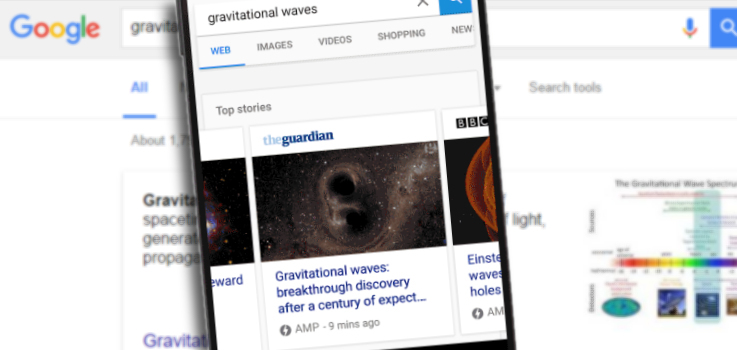
What Are Accelerated Mobile Pages?
Accelerated Mobile Pages (AMP) are versions of web pages (generally news, articles and blogs) that have had certain elements removed to make them load more quickly on mobile devices. Such elements usually include images and files that define complex layouts or behavior, including Cascading Style Sheet (CSS) files and JavaScript files. AMP web pages will also have free access to Google's high performance global cache servers, meaning that they can be accessed more quickly from around the world while still being hosted by the website owner. AMP pages must always be served from a secure server (having the "https" protocol).
AMP pages are built using AMP HTML, an open framework built entirely out of existing web technologies which allows web pages to be more lightweight. AMP web pages load an average of four times faster than traditional web pages and use up to ten times less data. In many cases AMP pages will seem to load instantly. "A page loads in less than half a second when Google's Accelerated Mobile Pages is enabled. Instead of taking three seconds to load the average page," said Nuzzel's founder Jonathan Abrams in a Fortune interview. You can compare a AMP version and non-AMP version of a news story on the Guardian website in your browser.
AMP Background And Early Adoption
The AMP project was launched in October 2015 as an open-source initiative by Google after consultation with publishers and technology companies around the world. Google has long been aware that while most internet surfing is now performed on smartphones and tablets and, despite their push to encourage all websites to become mobile-friendly, the user experience continues to be disappointing. Not only do slow-loading website frustrate users, but they also result in lost revenue for advertisers and retailers. Because of this, one of the priorities of the project is to maintain existing ad formats and payment gateways, but to find ways to ensure they can be delivered faster.
"We want web pages with rich content like video, animations and graphics to work alongside smart ads, and to load instantaneously. We also want the same code to work across multiple platforms and devices so that content can appear everywhere in an instant - no matter what type of phone, tablet or mobile device you're using," a spokesperson for Google said in the announcement. At launch, over 30 major internet companies, including Twitter, Pinterest and WordPress.com, were planning on using AMP web pages to deliver their content.
By early February 2016 hundreds of major publishers and technology companies had begun to use AMP technology. "Any story you choose to read will load blazingly fast - and it's easy to scroll through the article without it taking forever to load or jumping all around as you read. It's also easy to quickly flip through the search results just by swiping from one full-page AMP story to the next," a Google spokesperson said. And in July 2016, eBay also announced that it was planning on working with Google to create a "full-fledged e-commerce experience in AMP" this year.
How AMP Affects Search Engine Optimization (SEO)
In a February 2016 Google+ Hangout, Google's John Mueller confirmed that AMP in itself does not contribute to how well a web page ranks for a search term. Simply put, if a web page built the traditional way is just as relevant, and just as fast (however unlikely that is),it will not lose out to an AMP page in rankings for that reason alone. However, since page speed is becoming more and more important, it makes sense that AMP pages will outperform non-AMP pages if all other factors are equal. In addition, Google has signaled it's long-term commitment to the AMP project, and has hinted that it may become a ranking factor in the future. "Webmasters should think now about getting ready for AMP," Google's Gary Illyes said in his keynote speech at the SMX Advanced conference on June 23rd 2016.
Regardless of whether or not AMP contributes to how highly a web page ranks in organic search results, relevant AMP pages already appear in the Top Stories section of mobile search results in the United States, United Kingdom, France, Germany and 8 other countries, inevitably resulting in more exposure and better click-through rates than the organic search results below. Web pages powered by AMP technology are also annotated as such to alert users to the fact that a better experience awaits them when they click on these results:

Should You Adopt AMP?
According to builtwith, less than 40,000 websites were using AMP in November 2016, with many of these being outwith the top 1 million websites. So AMP is not yet critical for most websites, especially since there are many other factors that influence how highly your web pages rank that you should be concentrating on. Indeed, even Google's planned move to a "mobile first" index will not treat AMP versions of web pages as the default mobile version, even if no other mobile-friendly version exists.
While in the past websites commonly had a separate mobile and desktop version, now they are now mostly built using responsive web design. When asked if website owners should consider now replacing the mobile version of their website or responsive website with a desktop-only version and an AMP version at the SEJ Summit in April 2016, Google's Maile Ohye said that they should definitely not. Instead, she advised that people should "think about how Google will use AMP in the future and for site owners to think about making sites AMP friendly for the future". Indeed, since AMP is currently only implemented in 12 counties, AMP does not contribute to how mobile-friendly Google considers your website, and there are also many types of content that Google is not yet showing in AMP, this approach would actually harm your website.
Therefore, it is still best practice to maintain a responsive website that caters to all devices, while at the same time potentially having AMP version of specific pages on your website (such as news stories or blog entries). However, unless your website is primarily a source of news stories, or you currently enjoy top search results for many queries and your business is dependent on this, you can quite safely defer implementation of AMP pages until they become more widespread or part of Google's core algorithms.


